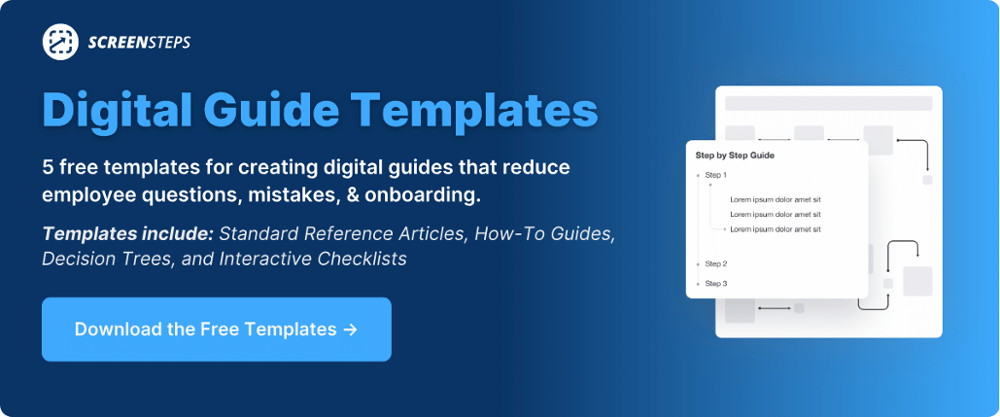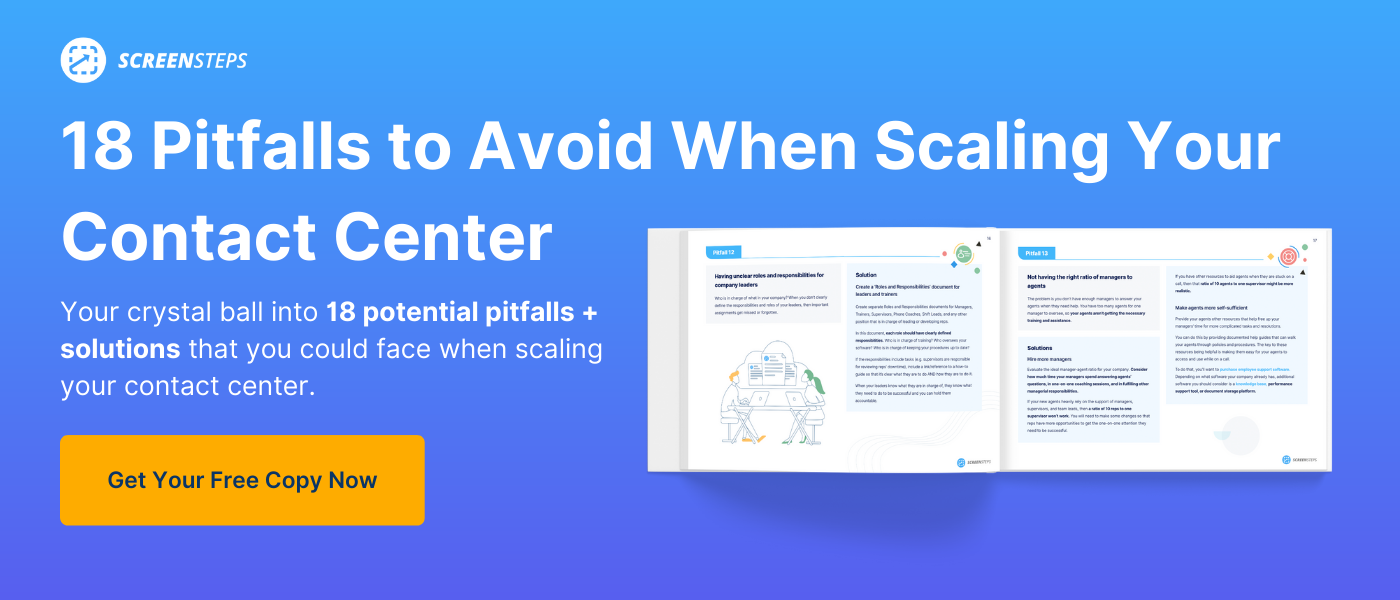
Santa’s not the only one making lists and checking them twice.
If you work in the Quality Assurance Department at a call center, you are well acquainted with quality assurance (QA). The problem as a QA leader is that your call center agents have so many responsibilities on any given call. And there are so many different policies and procedures?
What do you include in your QA checklist? How do you know which standards and expectations to include in evaluations?
Working for ScreenSteps — a knowledge base software company that provides call centers with documentation tools for call flows — I’ve learned about QA checklist elements that are commonly tracked in the call center community.
Below, I explain what a call center quality assurance checklist is and try to clear up some confusion about how and where the term is used. Then I provide seven must-have elements for your call center QA checklist.
A call center quality assurance checklist is a collection of standards your call center uses to evaluate call center agent performance. It is an outline of best practices. Quality assurance managers can use those standards to measure how well an agent is in line with its call center.
The QA checklist functions similarly to a QA scorecard where you have a rubric to measure how well agents remember and execute their training on a call.
It is set up as an order of operations by walking through the steps of how a call is supposed to be executed.
The QA checklist is important because it helps ensure that your call center’s standards and expectations are clear. Also, it ensures agents are incorporating the standards into the procedural job aids.

As you’ve researched QA checklists, you may have seen two definitions for call center QA checklists. These different definitions serve different roles. Those roles are preventive and post-call evaluation.
A call center QA checklist that is preventative is when you create a checklist that is a resource for agents while they are on a phone.
These QA checklists are more commonly referred to as job aids. These are your call flows, call center scripts, policies, standard operating procedures (SOPs, reference sheets, etc.
The more common definition — and the one we are using for the checklist elements below — is the second definition. The post-call evaluation call center QA checklist is used to evaluate agents after a call.
These post-call agent evaluations go through a checklist of best practices and give agents a score on how well they completed each aspect of the call. You can weight each element or sub-part of a call at a different level (i.e. giving a specific step more points to emphasize its importance).
If you do it right, you can create two versions for your different audiences out of one document. You can write one version of your QA checklist for your QA manager/evaluators. This would include scoring and evaluation questions.
Then you can create a QA checklist that is a procedural job aid. It mirrors the QA evaluation but doesn’t include scoring. It includes a checklist in consecutive order of everything the agent needs to do on a job.
Your call center QA checklist is meant to evaluate your agent’s performance from the moment the phone rings through the post-call tasks. There are a lot of things an agent needs to say and do when they answer a call.
Here are seven critical elements to include in your call center quality assurance checklist. Plus, we’ve included specific questions to help you evaluate and score each section.
The call center greeting is important for helping your call center agent take control of a call. By taking control, I don’t mean completely taking over the call. Taking control of the call means that the agent leads the call so that they can follow your procedures and reach a resolution faster.
A proper greeting means that the call center agent clearly identifies themselves and the company.
Every call center has different information that needs to be verified in order to proceed with a call transaction or share private account information.
This is especially important in industries that deal with compliance and privacy, like HIPAA in the healthcare industry or PCI in the financial industry.
Some information you may require for verification includes:
Understanding the customer’s needs is more than just figuring out what the caller needs help with. It’s also paying attention to the tone and words the caller is using. It is being an empathetic listener and expressing that empathy.
With active listening, your agent communicates with the caller to help the caller know they are heard and understood. Sometimes that comes by rephrasing what the caller said back to them.
Ultimately, your agent can handle the call by clearly communicating with the customer.
Every call center aims for first call resolution. You don’t want your customers to have to call back to resolve their issue. The goal of every agent is to provide a solution to the caller.
Your call center agents need to follow specific procedures for different scenarios.
Ideally, you will have these standard operating procedures documents — whether that is a step-by-step procedure, call flow, or call center script. That way your agents can reference it as they work through the caller’s issue.

Being a call center agent means having soft and hard skills. Soft skills are the behavioral talents that help reps have better interactions with the callers.
The hard skills refer to the knowledge an agent needs to have to help a caller (i.e. knowing how to use your systems, knowing how to follow your documented procedures, etc.).
Both soft and hard skills are part of the call center agents’ best practice list.
When your call center agent resolves the original purpose of the call, your agent’s instinct may be to say, “Have a good,” and hang up. Closing a call takes more than saying “goodbye.”
Before hanging up, your call center agent needs to review the call and ensure the caller has been taken care of, meaning the agent has achieved first call resolution.
Evaluate if the agent followed the proper call closing procedure.
Throughout the call, your agent will be taking notes. They need to document every interaction. However, it is difficult to take notes, look up information in your system, and carry on a conversation with a caller.
Typically, agents will need to finish up their notes after they have hung up the phone.
Holding regular evaluations of your customer service team is essential to the success of your call center. It helps agents improve their service. Having clear standards outlined in your call center QA checklist helps establish clear expectations.
However, if your agents don’t have access to those standards and see them in their day-to-day interactions, then your agents are at a disadvantage. Your agents need job aids and checklists of their own that they can use while they are on a call.
You can do that with a company knowledge base. Everything they have on a QA checklist also needs to be documented in your company knowledge base.
With a ScreenSteps knowledge base, your agents can quickly access job aids — including step-by-step workflow articles, reference sheets, checklists, and more — without putting a caller on hold. They can find the procedure they need in as few as two clicks.
That leaves less room for error and improves each agent’s chance at a perfect QA score.
Think a knowledge base could help your call center agents improve their performance? Compare some of the best knowledge base software platforms in the business.

Content Marketing Manager